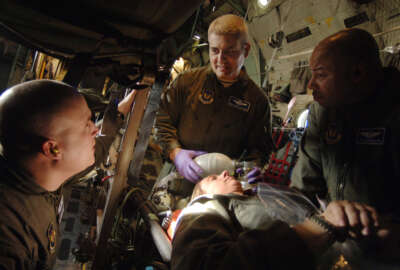 Exclusive
Exclusive Military services call for halt in transition of hospitals to DHA
The top officials from each branch want hospitals and clinics back under their control.
The leaders of the military services are calling on the Defense Department to reverse an ongoing plan that transitions control of hospitals and clinics from the military branches to the centralized Defense Health Agency.
The top service officials and secretaries of each military service signed an Aug. 5 memo that states the pressures of the COVID-19 pandemic exposed issues with the transfer of military treatment facilities (MTFs) to DHA.
Synopsis, a newsletter, first reported news of the memo.
“The DHA end-state, as designed, introduces barriers, creates unnecessary complexity and increases inefficiencies and cost,” the military officials wrote. “Service command and control of the MTFs as military units, through our direct support, was critical to commanders’ operational response [to coronavirus] and swiftly adjusting resources across the enterprise.”
The letter asks DoD to stop the transition of MTFs, personnel and resources, and to return all MTFs to their respective services until the best course of action can be determined.
The letter also asks DoD to direct the military departments to establish a working group to provide a concept plan for what the next steps should be and what legislation might be needed.
“The proposed DHA end-state represents unsustainable growth with a disparate intermediate structure that hinders coordination of service medical responses to contingency operations, such as a pandemic,” the officials wrote. “It was the services’ legacy structures that provided the streamlined command and control and the stability required for execution of plans and deployment of medical forces.”
The MTFs transition is legally required by the 2017 defense authorization act, and the services have already handed over many of their facilities. The Air Force finished giving DHA all of its MTFs late last year.
DoD and Congress both said they will move ahead.
“The department is continuing to implement the direction as legislated by Congress and signed into law by the president,” Pentagon spokeswoman Lisa Lawrence told Federal News Network. “The department remains focused on ensuring the services maintain a medically ready force and a ready medical force, as well as ensure all eligible beneficiaries have continued access to quality healthcare.”
A House Armed Services Committee aide said they want DoD to continue on its current path as well.
“More than four years after the law required the department to transform the Military Health System, the services are trying to further delay change and are using the COVID-19 pandemic as the reason to delay,” the aide said. “The transformation process, which is already more than a year into execution, should continue to move forward. The DoD’s medical response to the pandemic has provided lessons, which should be used to inform the plan moving forward, not grind implementation to a halt.”
Sean W. Kelley, former deputy chief information officer for account management and benefits at the Department of Veterans Affairs, said he was surprised by the memo because it may mean there are more issues with the transition than what is seen publicly.
“The transition is a huge paradigm shift for the services,” Kelley said. “It’s been going on since 2011 when Bethesda Naval Hospital and Walter Reed came together. However, there are benefits in centralization and command and control with seamless integration with DHA.”
Army Secretary Ryan McCarthy expressed his dissatisfaction with the DHA transfers at the beginning of the year.
In an internal Army memo, obtained by Federal News Network, McCarthy stated he was “concerned about the lack of performance and planning of both DHA and Defense Department Health Affairs with respect to the MTF transition.”
In the memo he suggested halting the transition until a detailed budget strategy and plan to transfer functions from the services is delivered.
“Like all mergers it’s about pacing,” McCarthy told reporters Wednesday at a Defense Writers Group event in Washington. “You are bringing thousands of people and functions to one organization. Like all mergers and acquisitions there are cultural dynamics, there are synergies you try to achieve and if you do it too fast you’re going to make a mess. This is the healthcare of our soldiers and their families.”
Copyright © 2025 Federal News Network. All rights reserved. This website is not intended for users located within the European Economic Area.
Scott Maucione is a defense reporter for Federal News Network and reports on human capital, workforce and the Defense Department at-large.
Follow @smaucioneWFED






